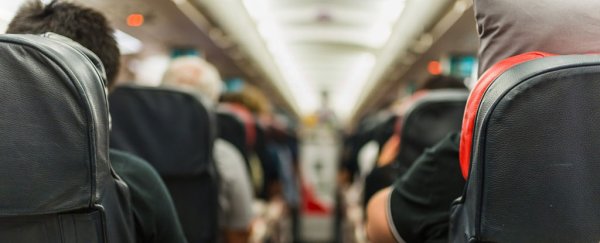There's a range of inconveniences and irritations in air travel that can lead to a whole lot of bad behaviour on an aeroplane, but a new investigation into the causes of 'air rage' incidents says it's not so much the shrinking seats, lousy food, or lost baggage that's to blame for people losing their cool in the air.
In fact, the single biggest factor associated with air rage in economy class turns out to be whether or not the plane you're in has a first-class compartment. If it does, the chances of an air rage episode occurring back in coach are nearly four (3.84) times higher, which the researchers say is equivalent to the effects of a 9-hour flight delay.
But why does the design of an aeroplane have such a pronounced effect on the behaviour of passengers on board? According to researchers at the University of Toronto in Canada, it's because the overt disparity between conditions in first class and economy are just too much for some people – especially in the cramped confines of a long-haul flight.
"The sense of inequality really relates to perceptions of unfairness, deprivation, frustration, agitation, and anger, which can in turn give rise to aggression and violence," organisational behaviourist Katherine A. DeCelles told George Dvorsky at Gizmodo. "[W]e're generally seeing people's emotional reactions, and what could be framed as a frustration reaction. And then being packed into a plane will intensify how you're emotionally feeling and reacting."
To figure out the causes of air rage, the researchers analysed thousands of documented flight incidents over several years on a large international airline.
The kinds of episodes involved included things that were considered to be a threat to onboard safety, like passengers yelling obscenities at flight attendants, refusing to sit down, or interfering with smoke sensors.
And it's not just the presence of a first-class cabin that makes these kinds of outbursts more likely. When economy passengers have to pass through the opulence of first class on the way to their own, less comfortable seats, the chances of an air rage incident are again higher (2.18 times more likely).
In addition to first-class considerations, other factors also made disruptive incidents more likely to happen, such as crowdedness, alcohol consumption, and long flights. But their impact was smaller than the researchers expected.
"I expected there to be more support for a lack of leg room as a contributor to air rage, given the attention that leg room has had – but there wasn't," said DeCelles in a press release.
And it's not just economy passengers behaving badly. When economy passengers are boarded through first class, first-class passengers are 12 times more likely themselves to cause a disruption.
"When people from higher social class backgrounds are more aware of their higher status, they are more likely to be antisocial, to have entitled attitudes and to be less compassionate," DeCelles told Carina Storrs at CNN.
But not everybody is satisfied with the researchers' hypothesis, saying there could be other factors at play here that aren't directly related to social inequality.
"There could be another thousand things associated with the presence of first-class seating [that are piquing air rage]," psychologist Michael McCullough from the University of Miami, who was not involved with the study, told CNN. "Extraordinary claims require extraordinary evidence. [This study] is provocative, but it does not strike me as an open and shut case."
If DeCelles and her team can find the evidence to back up their claims, what's the solution to curbing antisocial behaviour in the air? The team says anything airlines can do to de-emphasise the disparity between first class and economy would be a help, especially implementing a dual-gating system for boarding, so that economy passengers don't have to shuffle through first class on their way to their seats.
"The more you can use those dual gates to board airplanes, separating the first-class cabin from the economy cabin, you're going to have less air rage in both cabins," said DeCelles in a press release.
Other improvements could be making the economy cabin more appealing, not openly favouring first-class passengers in onboard service, and not repeatedly reminding economy passengers not to use the first-class toilets.
"People know that inequality is going to happen," DeCelles told Jessica Plautz at Mashable. "They just don't want to be treated like dirt."
The findings are reported in Proceedings of the National Academy of Sciences.
